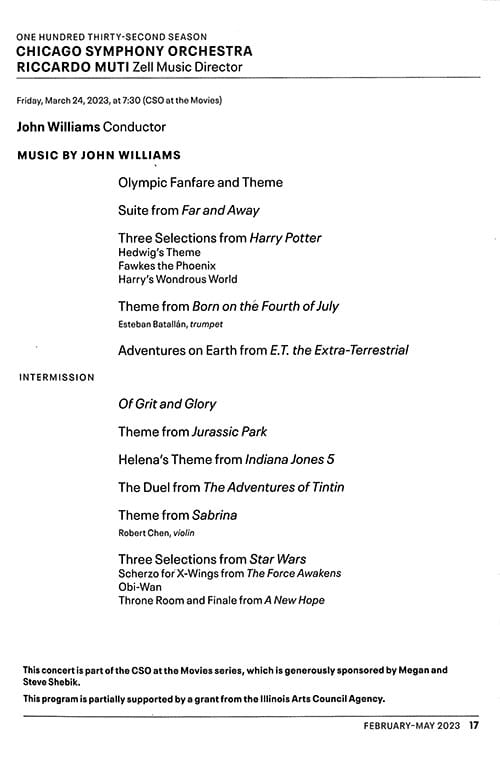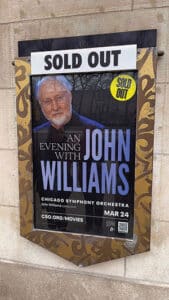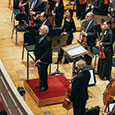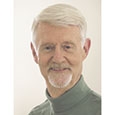
I was sitting in a sold-out Orchestra Hall. The Chicago Symphony had finished warming up and tuning as we awaited the conductor’s entrance. You could have heard a pin drop. Then, the stage door swung open, and John Williams stepped out to a standing ovation and deafening roar as he approached the podium. He turned to the orchestra and launched into his Olympic Fanfare and Theme.
The program was filled with music from several of his most celebrated scores plus more recent compositions. Following the final piece, the audience did not move. It took four encores, with Williams finally motioning the orchestra off the stage and giving a smiling goodbye wave, before the concert came to a close. I have since spent much time reflecting on the impact of this magical evening.

Conducting
I admire many professional conductors who turn the works they conduct into musically moving experiences that stay with you. My favorites include Muti, Solti, Giulini, Ormandy, Dudamel, and my idol, Leonard Bernstein. They are all known for distinctive movements leading to outstanding performances. I add John Williams to this list because his conducting is so meaningful due to his knowing every minute detail of his music. Every visual movement he makes is purposeful, meaningful, and musical.
As one who has studied and taught conducting, these observations reinforce some of my basic beliefs. To be a fine conductor obviously requires knowing basic patterns and giving musicians what they need. It also takes a fearless approach to make unorthodox gestures that portray the sounds and meanings of the notes. Those kinds of movements can create a unique and even transcendental result.
Expectations
The audience at this concert, which ranged in age from children to senior citizens, undoubtedly had certain expectations. They were very familiar with recordings of the music and probably thought it would sound exactly the same in concert. Mr. Williams might have worried that the audience would feel disappointed if the live performance was not identical to the music heard in the films, during sports and news broadcasts, or on album recordings. To the contrary, Williams must have been confident that the program would move us in an extraordinary manner, and he had us as he entered through the stage door.
From the downbeat of any such amazing concert, the performer and audience are locked into a unique time and space. The performance that night belonged only to us. At concerts where video and recording are not permitted, people still yearn to capture a bit of the performance to have as their own. This is why music must be made and heard live. Recordings are like postcards that give us wonderful reminders and help us remember. However, music must be recreated in real time again and again to make it live both in the moment and in the memory.
 Rehearsing
Rehearsing
Accounts from orchestra members confirm that Williams is all business in rehearsals, and even members of the Chicago Symphony are asked to tidy things up and make adjustments. These same players report that their parts are quite difficult yet within the range of what is possible to execute. Williams’ choice of instrumentation is unfailingly flawless, making themes and counter-themes not only heard but balanced. This is due to his compositional skill and by the orchestra playing on stage in a particular space.
Education
Music composed by John Williams reveals his stellar ability to translate his ideas with unmatched orchestration technique. As with many fine composers, his formal education included study with eminent teachers at prestigious institutions. Perhaps because he worked side-by-side as an orchestrator with such legends as Franz Waxman, Bernard Hermann, and Alfred Newman, he is unmatched in creating wonderful symphonic color palettes. He combines that skill with his uncanny ability to capture the emotions and action of the films he scores.
Steven Spielberg remarked, “without John Williams, bikes don’t fly, nor do brooms in Quidditch matches, nor do men in red capes. There is no Force. Dinosaurs do not walk the earth. We do not wonder, we do not weep, we do not believe.” He is a consummate dramatist who knows where music is needed in a film but also where it is not needed.
In many cases, his music becomes a character. Who doesn’t recognize the shark theme in Jaws? His Star Wars scores are, in fact, quite operatic. He shares musical story telling with the great Romantics of the past – Berlioz, Respighi, and Tchaikovsky. Were they alive today, one or all of them might be composing scores for film. Today’s young composers only need look to John Williams to realize the need to truly understand the capabilities of instruments and also what combinations work best to realize their intentions.
Collaboration
Clearly, John Williams has a close relationship with the Chicago Symphony. He has conducted numerous concerts with them, composed a horn concerto for the late Dale Clevenger, and asked that they record his film score for Lincoln, which was recorded in Orchestra Hall with director Steven Spielberg and actor Daniel Day Lewis in attendance keeping a close eye on the proceedings. The players not only understand how important this music is to audiences, but they embrace it and enjoy performing it. Even though their facial expressions are subtle while playing, it is hard to miss the delighted looks and slight smiles when they stand and acknowledge the audience’s applause.
The orchestra clearly loves collaborating with Williams and must hope that first-time visitors to Orchestra Hall return for future concerts. For many years I taught a music appreciation course based on the music of Broadway and Hollywood, and it is not difficult to step from the movie theater and a John Williams’ Stars Wars score, to the concert hall and Gustav Holst’s suite The Planets.
Meanings
Musing about my fantastic evening with the CSO and John Williams brings me to a few basic thoughts. Today, the musical world encompasses many periods, styles, and genres. That world keeps evolving, changing, and expanding. In every kind of music there are good and bad examples. Some define a culture itself, or touch the human spirit as nothing else can. Don’t miss out. Be open to them all. As for John Williams and the Chicago Symphony Orchestra, I and the rest of the audience can be thankful that we were able to experience an evening together with them. That experience belongs only to us.
Orchestra photos courtesy of the Chicago Symphony Orchestra, photos by Anne Ryan






